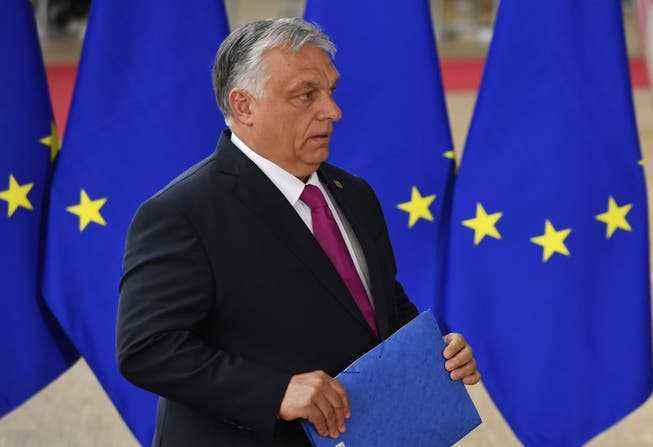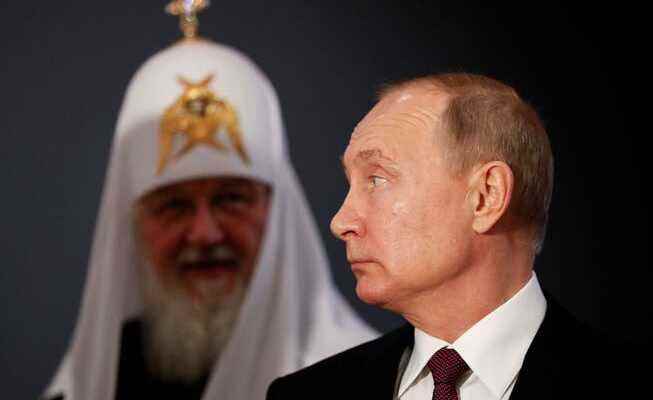Budapest blocks and accepts the EU oil embargo twice within a few days after making concessions. Orban is aggressively trying to combine economic interests and ideological proximity to the Russian Orthodox Church – with ambivalent consequences.
Moscow Patriarch Kirill provides the central ideological justification for Putin’s war of aggression against Ukraine.
When the EU heads of state and government agreed on an oil embargo against Russia at the beginning of the week, Hungary was also on board after weeks of blockade. Because of its energy dependency on Moscow, the East-Central European country has demanded guarantees and concessions – and has received them through transitional periods and the exclusion of deliveries via pipelines from the embargo.
But on Wednesday evening, Budapest suddenly stood in the way again: It was unacceptable that Kirill I, the Patriarch of Moscow, was included on the sanctions list. The negotiations go into an extra round, the EU finally exempts Vladimir Putin’s close ally from the punitive measures.
«A question of principles»
The already tense relations between Hungary and almost all of the rest of the EU have since become even more troubled. Diplomats in Brussels complain that Orban did not say a word about Kirill at the summit and emphasize that agreements are not called into question at a deeper level. The government in Budapest, on the other hand, points out that its position has been known since the beginning of May. “It was a question of principles for us”, declared Foreign Minister Peter Szijjarto on Thursday«Religious freedom is something we insist on just as much as our national interests.»
Now it’s actually up for debate whether sanctions against religious leaders cross a red line. It could be argued that this closes an important channel for dialogue. Russian intellectuals also noted on Thursday that Europe would deal with the punitive measure against the separation of church and state that is deeply rooted in the continent violated Hungary argues that with an entry ban Russian Orthodox in the EU isolated from their religious leader would.
None of these arguments are really convincing. Kirill is the opposite of a man of dialogue, and in Russia the lines between church and state are fluid. Rather, the patriarch provides the ideological framework for Putin’s invasion of Ukraine as holy war for the reunification of a Great Russian empire and disguised as a defensive struggle against Western values. This has led to a major defection movement in international orthodoxy, and Pope Francis even referred to Kirill as «Putin’s altar boys».
Privileges for a tiny church
In sharp contrast, Hungary has given high priority to relations with the Russian Orthodox Church over the past five years as part of its political and economic opening to Russia. In 2017, there were only a good 2,000 members in 12 Orthodox parishes in the predominantly Catholic country. Nevertheless, these received alone for renovations the equivalent of over 6 million Swiss francs – almost a quarter of the sum paid to all the churches in the country for this purpose.
Like Kirill back then at a meeting with Foreign Minister Szijjarto in Moscow explained that good memories from the Soviet era connect him with Hungary. In the 1970s and 1980s he maintained an intensive ecumenical dialogue with the Protestant Church in the city of Debrecen. In opposition to communism, the common Christian value system was maintained.
This is an extremely selective representation because, firstly, Kirill was at the time long been an agent of the KGBand secondly, the Hungarian Protestants too arranged with the Kadar regime. Nevertheless, the story has served the rulers in Moscow and Budapest ever since as a basis for the common rejection of social liberalism. Just two weeks ago praised Moscow Patriarch Orban as a European politician who is “outstandingly committed to strengthening public morals and the institution of the traditional family”.

Viktor Orban at the EU leaders’ summit this week.
Christianity and pro-Russian positions
While opposition to the “Western mainstream” has made Russia a fierce geopolitical opponent of Europe and the US, Hungary’s foreign policy is more contradictory. Orban is committed to NATO and EU membership, but not only serves Russian interests economically, but also through a kind of religious diplomacy. How ambivalent the results can be is shown, for example, by the protection of persecuted Christians in the Middle East, which Moscow and Budapest are emphatically pursuing and which is fundamentally justified. But Putin uses it to justify the military intervention in Syria, which Kirill also sees as a “holy war”.
Another example of this uneasy mix of Christianity and pro-Russian positions presented itself in mid-May during the American Conservative Political Action Conference, which was held in Budapest for the first time on European soil. In addition to Orban, one of the main speakers was the American Fox News star Tucker Carlson, who takes positions in the Ukraine war that can hardly be distinguished from those of Moscow. The Rassemblement National, which was financially supported by the Kremlin at least in the past, was also present.
However, Orban actually knows exactly how far he can push his opposition so as not to completely isolate himself in Europe. This has become more difficult with the Ukraine war. The disruptive maneuvers in the oil embargo in particular are irritating the central ally, Poland, in the long term.
The recent intervention in favor of Kirill is likely to increase mistrust. It also comes across as slightly erratic, in contrast to Orban’s usually cunning policies, which raises the question of whether it was all about Kirill. So reported the correspondent of the Polish radioHungary has not only demanded the patriarch’s removal from the sanctions list, but also an exceptional permit for the partially state-owned raw materials company Mol to sell Russian oil to other countries. The company has made huge profits in recent months by exporting it in refined form as the Brent variety. In any case, Hungary has not prevailed: In the sanctions provisions published on Friday resale is explicitly prohibited.
